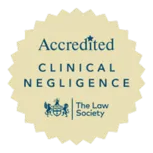What happened
Mrs S first sought medical help after struggling with ongoing breathing difficulties and fatigue. A scan was carried out on 19 July 2019, but she was reassured that no abnormalities had been found. Despite continuing to feel unwell, she was told there was nothing serious to worry about.
Over the following few months, she underwent further CT scans which revealed nodules on her lungs. Unfortunately, these findings were not properly followed up by the hospital, and no further investigations were arranged.
In the months and years that followed, Mrs S continued to see both GP and hospital with ongoing problems, including chest pain and a persistent cough. At one stage, she attended A&E and underwent a chest x‑ray, which showed an abnormal finding in the upper part of her lung. This corresponded with a nodule that had already been visible on an earlier CT scan, yet again, no further investigations were carried out.
It was not until January 2023 that Mrs S was finally referred under the urgent two‑week suspected cancer pathway. When she attended the specialist lung clinic, both a chest x‑ray and CT scan confirmed the presence of lung cancer. Just weeks later, she received the devastating diagnosis of Stage 3 squamous cell lung cancer.
Mrs S underwent chemotherapy and radiotherapy, but sadly her condition continued to deteriorate, and she was placed on palliative care.

Legal and medical challenges
This case raised serious concerns about how long it took for Mrs S’s lung cancer to be properly diagnosed. Small growths known as lung nodules had been seen on her earlier scans. These nodules are recognised warning signs and should always be investigated further, because they can sometimes indicate the early stages of lung cancer. When these signs are not acted upon, it can mean a crucial window of opportunity for earlier treatment is lost, which can have a serious impact on the patient’s outcome.
From a legal perspective, we argued that the hospital’s failure to act on the CT scan results from several years earlier had directly led to a significant delay in Mrs S being diagnosed. This delay meant her cancer was not picked up until it had already progressed to an advanced stage, leaving her with far fewer treatment options.
After finally being diagnosed, Mrs S underwent both chemotherapy and radiotherapy in the hope of slowing the progression of her illness. Sadly, even with this treatment, her condition continued to worsen, and she was eventually placed on palliative care, which is treatment focused on managing symptoms and improving quality of life rather than curing the illness.
By this point, we had already made a formal Part 36 offer of £275,000, which is a legal process that allows one side to propose a settlement, giving the other side 21 days to respond. During that 21‑day period, Mrs S’s condition sadly continued to worsen. She told us that it was very important for her to see her claim concluded so she could enjoy the compensation with her family whilst she was still alive. This added a personal urgency to the case, as it was about more than money - it was about giving her the chance to create special memories and find some peace in knowing her family would be supported.
Given this change in her health, we contacted NHS Resolution, the organisation that handles claims on behalf of NHS Trusts, on a confidential basis, known in law as “without prejudice.” This means the discussions could take place openly without being used against either side later in court.
NHS Resolution confirmed that they had authority to make an immediate offer of £150,000 without needing to go back to the Trust or their legal representatives for further approval. Mrs S was relieved and very happy to accept this settlement. It meant she could use the money straight away to enjoy precious time with her family. It also gave her reassurance that her family would be supported with the costs of her funeral when the time came.

The outcome and how the compensation helped
Mrs S’s case was resolved with a settlement of £150,000. Whilst no amount of money could undo the harm caused by the delay in her diagnosis, the outcome gave her the chance to spend meaningful time with her loved ones and create memories that she and her family would treasure during the final stage of her life.
The compensation allowed her to enjoy special experiences with her family, including a trip to Lanzarote and a journey on the Orient Express. These moments brought joy and togetherness in the midst of an incredibly difficult time, offering her and her family precious memories that will remain with them forever.
On the balance of probabilities, treatments following earlier diagnosis would have led to a long-term cure, but the settlement ensured her final months were filled with love, and the reassurance that her family would be supported in the future. It brought comfort to Mrs S to know that, even in the hardest of circumstances, something positive had been achieved for her and those she loved most.
Simpson Millar’s support
From the beginning, we recognised how important it was to provide Mrs S with clear communication and genuine support. As she had difficulty hearing, our Medical Negligence Solicitors made the effort to meet her in person to ensure she fully understood what was happening and felt comfortable asking questions.
We also kept her son closely informed throughout the case, so the family felt reassured and involved. As her health declined, we worked quickly and carefully to secure a settlement that she could benefit from in her lifetime.
Mrs S told us how much it meant to her that her wishes were listened to and that she felt fully supported through such a difficult process. For us, being able to achieve this outcome for her and her family was a privilege.

How we can help others facing cancer misdiagnosis or delays
At Simpson Millar, we know how devastating it can be when cancer is not diagnosed as early as it should have been. A delay in diagnosis or a misdiagnosis can change the treatment options available and, sadly, the outcome for patients and their families. That is why our Medical Negligence Solicitors are dedicated to helping people who have been let down by avoidable medical errors.
We provide clear, practical advice in plain English, so you always know where you stand and what the next steps will be. Our team works sensitively and with care, making sure both you and your loved ones feel supported throughout the process. Where possible, we will seek to secure interim payments so that treatment, care or quality‑of‑life improvements can be put in place whilst the case is ongoing.
Compensation cannot turn back the clock, but it can make a real difference. It may help to cover the cost of treatment and care, support your family financially at a difficult time, and give you the chance to make important memories together.
If you or a loved one has experienced a delay in the diagnosis of cancer, or a misdiagnosis that has had a serious impact, you may be able to make a claim for compensation. Speak with our Medical Negligence team today for a free initial consultation by calling 0808 239 5461 or requesting a callback. We will listen carefully to your story, explain your options clearly, and help you decide on the best way forward.







